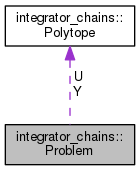|
fmrbenchmark
0.0.4
|
Representation of problem instances. More...
#include <problem.hpp>

Public Member Functions | |
| bool | change_order (int new_numdim_output, int new_highest_order_deriv) |
| std::string | dumpJSON () const |
| Get description of problem in JSON. More... | |
| int | get_highest_order_deriv () const |
| int | get_numdim_output () const |
| bool | is_consistent () const |
| void | to_formula (std::ostream &out) const |
| Create formula using SPIN LTL syntax http://spinroot.com/spin/Man/ltl.html. More... | |
Static Public Member Functions | |
| static Problem * | random (const Eigen::Vector2i &numdim_output_bounds, const Eigen::Vector2i &highest_order_deriv_bounds, const Eigen::VectorXd &Y_box, const Eigen::VectorXd &U_box, const Eigen::Vector2i &number_goals_bounds, const Eigen::Vector2i &number_obstacles_bounds, const Eigen::Vector2d &period_bounds, const Eigen::VectorXd &Xinit_bounds=Eigen::VectorXd()) |
| Generate a random problem instance. More... | |
Public Attributes | |
| std::vector< LabeledPolytope * > | goals |
| std::vector< LabeledPolytope * > | obstacles |
| double | period |
| Polytope * | U |
| Eigen::VectorXd | Xinit |
| Polytope * | Y |
Friends | |
| std::ostream & | operator<< (std::ostream &out, const Problem &prob) |
| Output description of problem in JSON to a stream. | |
Representation of problem instances.
| std::string integrator_chains::Problem::dumpJSON | ( | ) | const |
Get description of problem in JSON.
|
static |
Generate a random problem instance.
| numdim_output_bounds | range of integers from which the dimension of the output space will be chosen. |
| highest_order_deriv_bounds | range of integers from which the order of derivation (i.e., the number of integrators in the ODE defining the system) will be chosen. |
| Y_box | the compact subset of the output space in which the trajectory must remain, defined using the same format as for Polytope::box(). Unlike most other parameters of this method, Y_box is not a definition of the support of a probability density function. However, the number of elements in it that are actually used depends on the randomly chosen number of dimensions of the output space. |
| U_box | analogous to Y_box but for the input space. |
| number_goals_bounds | range of integers from which the number of goal polytopes in the output space will be chosen. |
| number_obstacles_bounds | analogous to number_goals_bounds but for obstacles. |
| period_bounds | range from which is uniformly randomly chosen the constant period by which the original system is discretized. |
| Xinit_bounds | (optional) the box from which the initial state will be chosen. It is assumed to be consistent with Y_box. Bounds for missing dimensions are assumed to be [0,0], i.e., Xinit is assigned 0.0 at the corresponding indices. E.g., if Xinit_bounds has size 0 or is not given, then Xinit is the origin of the state space. |
N.B., several parameters depend on each other in terms of consistency. E.g., if numdim_output_bounds = [2, 3], then Y_box must have length of at least 6 (cf. documentation for Polytope::box()).
This method relies on rand() for pseudo-randomness and assumes that something else has seeded the RNG.
| void integrator_chains::Problem::to_formula | ( | std::ostream & | out | ) | const |
Create formula using SPIN LTL syntax http://spinroot.com/spin/Man/ltl.html.
Support for other syntax is coming soon.
 1.8.8
1.8.8